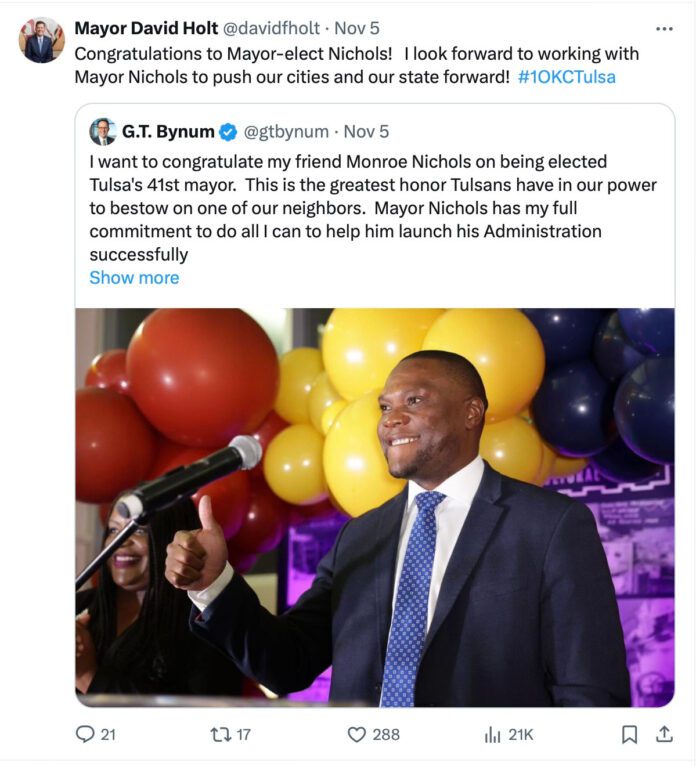Outgoing state Rep. Monroe Nichols, a Democrat, became the face of what historically was a solidly Republican town with a resounding 55%-44% victory against longtime Tulsa County Commissioner Karen Keith.
It shouldn’t be lost on anyone that Nichols was elected 103 years after the nation’s worst race massacre – and in a year in which the last survivors of the carnage that destroyed Greenwood and Black Wall Street again were denied justice for their suffering and losses.
But as Tulsa continues to reckon with its past, Nichols’ mayorship gives a glimpse into the city’s future – and the state’s.
Oklahoma’s two largest cities – its capital, Oklahoma City, and Tulsa – will be led by uniters, not dividers. By mayors who clearly view diversity, both in race and thought, as strengths, not weaknesses, especially when it comes to building the great cities of the 21st century.
As urban centers grow in population and rural areas shrink, Nichols and Oklahoma City Mayor David Holt are likely to become the prototypes of future successful candidates for public office.
The charismatic Nichols, 41, is a Texas native who crossed the Red River to play football at the University of Tulsa and never left. He spent the last eight years representing Tulsa in the GOP-dominated Oklahoma House, where he focused on improving education and encouraging affordable housing.
“I think the best thing of the legislative experience,” he told the Tulsa World last year, “is how it has helped me navigate relationships with people I don’t agree with all the time. … I have become a much more patient leader.”
In Oklahoma City, Mayor David Holt, a former Republican state senator, champions inclusivity, a sharp contrast from the president-elect whose anti-immigrant rhetoric invokes Nazi imagery – vermin, anyone? Holt’s leadership has conveyed a table that is open to everyone, regardless of race, religion, or sexual preference
It’s not always so, of course. Like any city, there are powerful longtime interests that can make progress trickier than it should be. But Holt deserves credit for speaking up repeatedly for the least among us.
He even wrote a thought-provoking essay in advance of the general election in which declared he would vote for “virtue. He didn’t name names, but it was widely viewed as a repudiation of Donald Trump’s misogyny, racism, homophobia and transphobia.
Nichols and Holt would be excellent governors or U.S. senators, but neither could be elected under present rules governing Oklahoma elections.
Holt is too moderate to win a Republican primary currently dominated by the hardest of the hard right. Nichols could win the Democratic nomination, but not the general election where tribalism rules.
That could soon change. Efforts are underway to get a state question before voters that, if approved, would create open primaries – candidates from both parties appear on the same primary ballot. The top two vote-getters then would then face off in the general election. Could be two Rs or two Ds, but throwing all voters into one primary pot could lessen the power of political extremes in both parties.
That would be good news for politics and public policy in Oklahoma.








